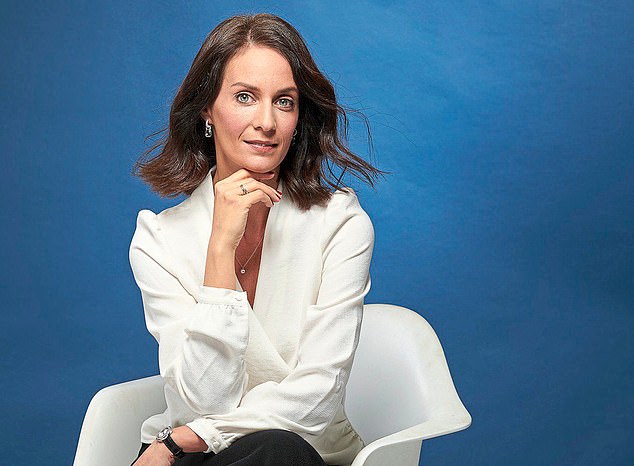All couples would like to think they know their partner’s life inside out.
And it’s no different when it comes to a spouse’s finances – from income to debt, savings to bad money habits.
But just how often do couples talk about their money – and are they always truthful?
Insurer Aviva has spoken to 2,000 people in a relationship, marriage or civil partnership to find out just how intimately they know their partner’s finances.
Take our quiz to see how well you know your partner’s money habits – and how your answers stack up against other couples.
Or, even better, answer the questions together.

Research: Insurer Aviva has spoken to 2,000 people in a relationship, marriage or civil partnership to find out just how intimately they know their partner’s finances
How many secret rainy-day financial accounts or pots of money do you have that your partner doesn’t know about?
- a. Zero
- b. One
- c. Two
- d. Three to four
- e. Five or more
Most common answer: If you answered ‘zero’, then you’re like most of those who took part in the survey.
Almost 53 per cent don’t have any secret accounts – but 26.1 per cent have one secret account or pot of money while 14 per cent have two secret accounts for a rainy day.
How much do you have saved in these secret pots?
- a. £500 or less
- b. £501 to £1,000
- c. £1,001 to £2,000
- d. £2,001 to £3,000
- e. £3,001 or more
Most common answer: Just under 30 per cent of savers are hiding between £501 and £1,000 from their partners, while almost 27 per cent have between £1,001 and £2,000. Just 7 per cent have less than £500.
On average, savers have slightly more than £6,495 secretly stashed away.
Why do you have these secret pots? (Select up to five answers.)
- a. To pay for debt, credit or store cards that my partner doesn’t know about
- b. Putting money aside for my children’s future – for example, a first flat
- c. To keep some control or independence of my finances
- d. To treat myself or make purchases when I want to, without my partner knowing
- e. To pay for a surprise gift for my partner
- f. It’s a safety in case my relationship breaks down
- g. To avoid feeling stuck or trapped
- h. To pay for a holiday
- i. To help out family or a friend
- j. No specific reason
Most common answer: People mostly want a secret fund to retain some control over their finances (31 per cent) or pay for a holiday (27 per cent).
But almost 27 per cent keep a hidden pot to avoid feeling trapped. Just 10 per cent don’t have a specific reason for their secret rainy-day accounts.

Hidden hoards: People mostly want a secret fund to retain some control over their finances (31%) or pay for a holiday (27%)
How well do you know your partner’s finances, such as savings, debts, income, spending habits and financial stability?
- a. I know everything about my partner’s finances
- b. I have some idea but I don’t think they’re hiding anything
- c. I have some idea but I suspect they have money I don’t know about
- d. I have no idea about my partner’s finances
Most common answer: Almost 45 per cent believe they know everything about their partner’s finances while a further 30 per cent have some idea, but don’t believe their partners are hiding anything.
This is despite nearly half (47 per cent) keeping a pot of cash hidden from their spouse.
How often do you talk about money with your partner?
- a. Every day
- b. Two to six days a week
- c. Once every one to three weeks
- d. Once a month
- e. Once every two to 11 months
- f. Once a year
- g. Never
Most common answer: More than 8 per cent talk to their partner once a day about money, while almost 18 per cent have financial chats just once a month.
Some 5 per cent never talk about money with their spouse. On average, couples talk about money seven times a month.
How often do you argue about money with your partner?
- a. Every day
- b. Two to six days a week
- c. Once every one to three weeks
- d. Once a month
- e. Once every two to 11 months
- f. Once a year
- g. Never
Most common answer: While the most common answer was ‘never’, most couples do argue about money, the survey reveals, whether that’s once a year or a few times every month. On average couples argue 5.4 times a month about money.
If you do argue, what do you most often argue about? (Select up to five answers.)
- a. Income differences
- b. How much you or your partner should contribute to household bills, holidays and more
- c. Too tight with money
- d. Secret accounts
- e. Planning for the future, such as retirement or pensions
- f. Who has spent the most in a given month
- g. Credit card usage
- h. Too extravagant with money
- i. Nothing triggers the arguments
- j. Who pays for what
- k. Too much debt
Most common answer: If you said ‘too extravagant with money’, you’re not alone. In fact, 31 per cent think their spouse spends too much, while 21 per cent don’t think they spend enough.
What joint financial accounts do you have with your partner?
- a. Savings account
- b. Credit card
- c. Current account
- d. Investment accounts
- e. I don’t have any joint financial accounts
Most common answer: Most people have a shared current account with their spouse – 54 per cent – while 44 per cent have a joint savings account. Almost 14 per cent have no joint accounts with their partner.
How many individual financial accounts do you have?
- a. Zero
- b. One
- c. Two
- d. Three to four
- e. Five or more
Most common answer: People are most likely to have two individual accounts (36 per cent), while 29 per cent have just one. A further 8 per cent of people don’t have any individual accounts. On average, people have two individual accounts.

Banking bliss: Most people have a shared current account with their spouse – 54% – while 44% have a joint savings account. Almost 14% have no joint accounts with their partner
What do you think are the biggest financial red flags in relationships? (Select up to five answers.)
- a. Late with paying bills
- b. Not having savings
- c. Buying expensive cars
- d. Frequent borrowing
- e. Secretive about finances
- f. Boasting about money or flashing the cash
- g. Gambling problems
- h. Trying to control your finances or making decisions without consulting you
- i. Poor credit history
- j. Tight with money
- k. Excessive debt
- l. Buying lots of designer items
- m. Not having a pension
- n. I don’t have any stand-out red flags
Most common answer: A gambling problem is the top issue, with 47 per cent thinking it is a financial red flag.
Excessive debt trails closely behind (44 per cent), while more than 19 per cent think being too tight with money is an issue. Just 7 per cent think it’s a red flag for their partner not to have a pension.
Those with secret accounts may soon find themselves in hot water as some 28 per cent of people think a partner being secretive about finances is one of the biggest red flags.
Sorry, but it’s never a good idea to keep money secrets
By VICKY REYNAL money psychotherapist
Now you’ve taken the quiz with your partner and discovered how you compare to other couples, you may have revealed a few gaps in what you know about one another’s finances or areas that make you both feel uncomfortable.
Make this a good starting point to build on your money discussions.
Perhaps you can now plan a monthly catch-up over a coffee where you can share concerns or outline what you’ve been spending and saving.

Money matters: Vicky Reynal believes relationships where partners try to understand each other’s money habits and tendencies are those that thrive
You might think that money intimacy doesn’t have any impact on your relationship as a couple but, in my experience in clinic, I’ve found that relationships where partners try to understand each other’s money habits and tendencies (rather than just criticise them or judge them for being different) are those that thrive.
It’s natural that two people, each with their own unique financial history and their unique personality traits (such as risk aversion, impulsivity, fearfulness or over-confidence) will approach money differently. And of course these differences can sometimes spark arguments.
Why did you spend so much at the pub? Why are you so stingy? How much were those shoes? Out of exhaustion, or fear of more conflict or judgment, some couples start hiding or lying about money. But secrecy won’t help in the long term.
The truth can set you free
Perhaps one of the most controversial questions in the quiz asks whether you keep a secret pot of money that your partner is unaware of. Considering that relationships are based on trust, I don’t think secrets are ever a good idea.
I have witnessed clients’ extended mental debates about the degree and pace of financial disclosure in relationships. And it’s true that financial disclosures may fill us with fear and dread.
We’ll ask ourselves if it is better to tell him the full truth at once? Will she leave me if I tell her about my debt? Will we get into another row if I tell her I went out gambling again? Will he only be interested in me if I tell him how wealthy I am?
They say the truth sets you free – and I believe this wholeheartedly because secrets are a heavy burden to carry. They weigh you down with guilt, worry and shame, and they are very isolating.
I have worked with several clients who came to me to build up the courage to disclose financial secrets to their partners. Their relationships did survive the disclosure – but it involved a long process of rebuilding trust.
There is a process of going from crisis to forgiving and repairing that needs to take place and might leave a metaphorical scar in the relationship.
It was significant to the outcome that the partner keeping the secret decided to ‘come clean’, which is very different from what happens in most cases where the secret is ‘found out’. That is very hard to recover from.
How we can inherit the secrecy habit
Many of the breaches of trust I have witnessed didn’t stem from a big intentional plot to disguise something, but rather from misunderstandings where one person considered something ‘secret’ while the other saw it as ‘non-essential information’.
You see how each person defines a ‘secret’ might be different and many crises in couples occur when these personal definitions differ.
For many, keeping secrets is what they are used to. Secrets might have been a feature of family life: children who knew of their parents’ affairs, but it wasn’t talked about or ever discussed.
Families in which too many conversations happened behind closed doors, leaving the children with a sense that few things can be talked about openly.
In a family where truths are hidden and maybe secrets even justified as a good way to ‘not hurt’ the other, it will inevitably make hiding the truth a viable option as a coping strategy for difficult feelings.
If you are contemplating keeping something from a partner, I would invite you to ask yourself why.
Are you afraid of their judgment? Are you maybe judging yourself and feel that sharing it would feel shameful?
Are you at some level trying to keep a distance between you and your partner because of your fear of closeness and intimacy?
Often people hide financial matters out of shame, guilt, fear of rejection or abandonment, or simply to avoid conflict – in the short term at least.
Secrets are consuming and isolating – and they cause havoc when they are discovered.
Whatever you fear will happen by disclosing the truth will have to be weighed against the emotional burden and risk of keeping it from your loved one.
- Money On Your Mind by Vicky Reynal is out now in paperback, £10.99, Bonnier Books.
